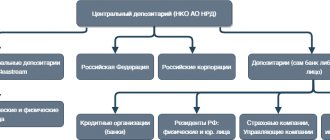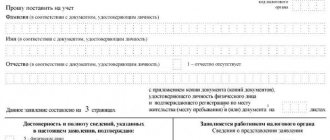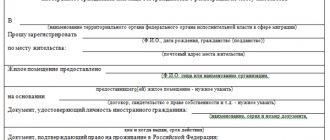In what case is a written notice prepared for the creditor organization?
If the law or agreement does not establish that the person who has incurred the debt is obliged to fulfill the obligations incurred personally, he has the right to ask another organization to pay off the debt for him.
The creditor organization is obliged to accept such execution (Article 313 of the Civil Code of the Russian Federation). But in addition, you should obtain written evidence that the funds received are money transferred for the debtor. If the payment order for the transfer of funds does not indicate that the money was transferred for the debtor, the creditor requests from the organization that repaid the debt a letter of confirmation that it paid for the organization that has the debt. In practice, creditors ask for a confirmation letter even if the payment order contains all the necessary information.
The Supreme Court explained the nuances of issuing a power of attorney to represent the interests of an individual entrepreneur in civil proceedings
On February 9, the Judicial Collegium for Civil Cases of the Supreme Court of the Russian Federation issued a Ruling in case No. 1-КГ20-13-К6 on the recovery of damages from an accident in favor of an individual entrepreneur under a claim signed by a lawyer on the basis of a power of attorney issued by the plaintiff entrepreneur.
Entrepreneur Amur Sabirzyanov filed a lawsuit against Ralif Fattakhov to recover 145 thousand rubles. for damage caused to the car of a third party as a result of an accident, who ceded to him the right to claim compensation for losses. The court left the statement of claim without consideration, citing the fact that it was signed by the plaintiff’s representative, lawyer Stanislav Ivanov, acting on the basis of a power of attorney dated July 25, 2021, issued and certified by the entrepreneur himself. The first instance considered that the claim was signed by a person whose powers were not properly certified, since the power of attorney was issued on behalf of the individual entrepreneur Amur Sabirzyanov and certified by him, which contradicts Part 2 of Art. 53 Code of Civil Procedure of the Russian Federation and Art. 185 of the Civil Code of the Russian Federation.
The appeal overturned the decision of the first court, returning the case to it for consideration on the merits. As explained by the second instance, in the notarized power of attorney issued by the plaintiff on November 16, 2021 in the name of Stanislav Ivanov, it was noted that the latter has the right to be a representative with the right to carry out procedural actions (including the right to sign a claim and bring it to court). This power of attorney was issued for a period of one year and was valid at the time the lawsuit was filed in court.
However, the Judicial Collegium for Civil Cases of the Sixth Court of Cassation of General Jurisdiction overturned the appeal ruling, leaving the decision of the first instance in force. At the same time, the cassation court proceeded from the fact that the meaning of certifying the principal’s signature is to confirm by a third party the fact that the signature on the power of attorney was executed by this person and not by any other person, thereby certifying the principal’s signature by himself contradicts the meaning of Art. 185 of the Civil Code of the Russian Federation and Part 2 of Art. 53 Code of Civil Procedure of the Russian Federation.
The cassation added that the person who issued the power of attorney cannot simultaneously certify the accuracy of his own signature, since such a certification cannot guarantee to third parties, to whom the power of attorney is subsequently presented, the authenticity of the principal’s signature. Consequently, a power of attorney issued by an entrepreneur on his own behalf cannot be recognized as properly certified, and therefore the claim was filed by a person whose authority to perform such a procedural action has not been properly confirmed. In addition, the cassation court indicated that the notarized power of attorney dated November 16, 2021 was attached only to a private complaint against the ruling of the trial court, and not to the claim.
The entrepreneur filed a cassation appeal to the Supreme Court, which considered it justified. The Judicial Collegium for Civil Cases of the Supreme Court explained that Art. 53 of the Code of Civil Procedure of the Russian Federation does not establish special rules for certifying powers of attorney issued by entrepreneurs. At the same time, part 6 of Art. 61 of the Arbitration Procedure Code of the Russian Federation provides that a power of attorney on behalf of an individual entrepreneur must be signed by him and affixed with his seal or can be certified in accordance with Part 7 of this article. A similar rule is contained in Part 7 of Art. 57 CAS RF.
“Issued by individual entrepreneur Amur Sabirzyanov in the name of Ivanov S.V. the power of attorney dated July 25, 2021 was signed by the plaintiff and affixed with his seal. Thus, due to the absence of a norm in the Code of Civil Procedure of the Russian Federation regulating the rules for certifying powers of attorney issued by individual entrepreneurs, the cassation court had to apply the analogy of the law in this case, which was not done, and therefore the cassation ruling is subject to cancellation. In addition, the ruling of the cassation court was made in an illegal composition, which is an absolute basis for its cancellation by virtue of paragraph 1 of Part 4 of Art. 379.7 Code of Civil Procedure of the Russian Federation,” noted in the ruling of the Armed Forces of the Russian Federation.
As the highest court explained, cassation appeals against rulings of district courts that have entered into legal force and rulings made as a result of their appeal are considered in the cassation court by a single judge. Meanwhile, the ruling of the Judicial Collegium for Civil Cases of the Sixth Court of Cassation of General Jurisdiction was made by three judges. Thus, the Supreme Court of the Russian Federation canceled the ruling of the cassation court and returned the case to it for a new consideration.
In the commentary to “AG” Stanislav Ivanov noted that the definition of the Supreme Court of the Russian Federation forms a uniform approach to formalizing the powers of judicial representatives in courts of general jurisdiction, since until that time in the practice of regional courts (including the courts of the Republic of Tatarstan) they adhered to a different point of view, that created certain obstacles in access to justice. “It should also be noted that the notarized form of power of attorney entailed additional costs for individual entrepreneurs when registering it,” he emphasized.
According to the lawyer, courts often left claims without consideration and returned them as filed by unauthorized persons due to non-compliance with the power of attorney form. “All this, of course, led to an increase in the time for consideration of the case, red tape in the consideration of civil cases and the denial of judicial protection of violated rights and legitimate interests. Moreover, many entrepreneurs were completely deprived of the opportunity to protect their rights due to the expiration of the statute of limitations due to the “improper” execution of a power of attorney. The Supreme Court of the Russian Federation has actually resolved the long-standing problem of different approaches to the execution of a power of attorney on behalf of an individual entrepreneur in arbitration courts and courts of general jurisdiction and has actually eliminated a gap in the legislation that was not resolved when the latest amendments were made to the Code of Civil Procedure of the Russian Federation,” summarized Stanislav Ivanov.
Lawyer of Law Firm “YUG” Sergei Radchenko called the Supreme Court’s determination legal and justified: “There really is no rule in the Civil Procedure Code on how individual entrepreneurs should issue powers of attorney. There are rules only for ordinary citizens and for legal entities.”
He noted, based on personal experience, that in practice individual entrepreneurs issue notarized powers of attorney to their representatives in courts of general jurisdiction in 100% of cases. “In civil law, the issue would be resolved simply: the rules governing the activities of legal entities are applied to the activities of individual entrepreneurs (Article 23 of the Civil Code of the Russian Federation). The subtlety, however, is that the rules on issuing powers of attorney for participation in court are not civil relations, but procedural ones; the Civil Code does not apply to them. Therefore, the Supreme Court of the Russian Federation quite correctly applied the analogy of the APC and the CAS on the issuance of powers of attorney by entrepreneurs and recognized that in order to issue a power of attorney in a court of general jurisdiction, it is enough for an individual entrepreneur to sign it and put a stamp,” he noted.
The expert also drew attention to a curious point in the case under consideration: “The Supreme Court of the Russian Federation overturned the cassation ruling also because it was made by an illegal composition of the court: the complaint should have been considered by a single judge, but was considered by a panel of three judges. A uniquely rare case in judicial practice. Apparently, the two “extra” judges had nothing to do, and they decided, together with their colleague, to consider the complaint “against three.”
Lawyer of the Moscow AP Oleg Lisaev believes that in the case under consideration, Part 2 of Art. 53 of the Code of Civil Procedure of the Russian Federation: powers of attorney issued by citizens can be certified by a notary or by the organization in which the principal works or studies. “An individual entrepreneur belongs to the category of self-employed people, that is, he works for an individual entrepreneur, and therefore, as an employer, he can certify a power of attorney, also by analogy of law. I think that the conclusions of the RF Supreme Court in this case will have a positive impact on judicial practice. The highest court of the country once again indicated that judges should take an informal approach to the consideration of disputes and, in the absence of a law regulating the relationship, boldly apply the law regulating similar relationships (analogy of law). In addition, individual entrepreneurs have the opportunity to save time and money. Now they do not need to contact a notary to draw up a power of attorney,” emphasized Oleg Lisaev.
How to write a written request
There is no unified form provided. An organization has the right to develop its own sample letter of payment for another legal entity and approve it in its accounting policies. Include the following required details in the document:
- name of the creditor, his address;
- number and date of the payment order;
- the amount transferred to the creditor;
- name of the debtor;
- an instruction to transfer funds for the violator;
- details of the letter to the company that has the debt;
- the basis for the occurrence of the obligation;
- signature of the head of the organization transferring funds;
- date and company seal.
Samples
Current sample letter about payment for another organization from the debtor to the payer:
| To whom: OOO "___________" Address: ________, Taxpayer Identification Number _______ |
OOO "__________"
We ask you to pay the supplier LLC "___________" (TIN/KPP __________, OGRN _____________, current account _______________ in PJSC Bank, account ___________, BIC ____________) for the goods under contract No.___ dated ___________ in the amount of _______ (__________________________) rubles .
We guarantee a refund.
Chief accountant of LLC "_________" __________________ /F. AND ABOUT./
General Director of LLC "________" _______________/ Full name/
The confirmation is drawn up on company letterhead. In addition to the required details, the drafters indicate the legal address, Taxpayer Identification Number, last name, first name and patronymic of the manager and the basis for the obligation. This is necessary to identify the creditor and the payment: sometimes the bank regards such receipts as an erroneous transfer of funds.
The details of the contract are indicated as the basis for the occurrence of a monetary obligation. If the parties did not formalize an agreement and the monetary obligation arose on the basis of an invoice issued by the creditor, the invoice details are indicated.
When repaying a debt, the debtor company should request a receipt from the creditor company for receipt of payment, which the latter is obliged to issue (clause 2 of Article 408 of the Civil Code of the Russian Federation).
Here is an example of a letter to a debtor:
And this is a sample letter of payment from a third party (debtor):
And this is what an agreement on payment with a third party looks like, concluded between a company that has a debt and its counterparty, who repays the monetary obligation.
Compilation requirements
The paper should contain these details:
- Date and place of creation.
- Passport details.
- If one of the parties is a legal entity, you need to indicate the name, INN, and address.
- List of powers that are transferred to the representative.
- The duration of the paper.
- Signatures.
Powers of attorney are divided into 2 types: one-time and reusable. If this is a one-time paper, you need to record information about the specific agreement, the rights to conclude which are transferred: information about the counterparty, the subject of the agreement, the amount under the agreement. In a reusable power of attorney, it is not necessary to indicate information about a specific transaction. However, it can be indicated that the representative has the right to conclude only specified forms of contracts. For example, purchase and sale agreements.
IMPORTANT! If the power of attorney does not contain all the required details, it may be declared invalid. In this case, the contract concluded by the representative is also considered invalid.










